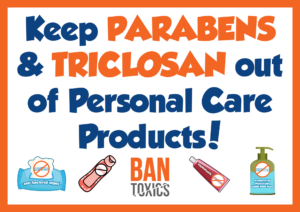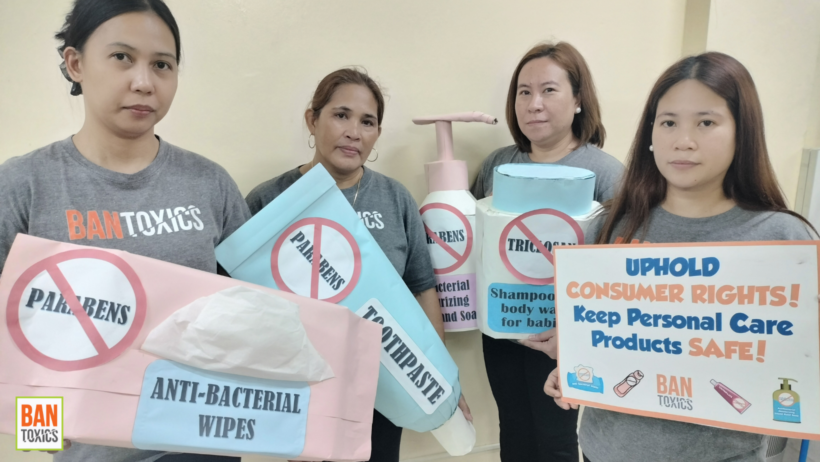In a press briefing in time for the observance of World Consumer Rights Month, BAN Toxics, a chemical and waste management NGO, discloses the findings of recent laboratory testing indicating the presence of parabens, triclosan, and triclocarban, classified as endocrine-disrupting chemicals (EDCs), in personal care products sold in the country. The result underscores potential health risks for infants, children, and adults alike as scientific studies have shown that said chemicals exhibit adverse health effects.

“Among 19 children’s products sent for chemical analysis, propylparabens (PPs) or butyl parabens (BPs) were detected in three products–a brand of kiddie toothpaste, an infant tooth gel brand, both manufactured in the Philippines and a baby body wash brand made in China. PP was detected in a range from 3.71 μg/g to 152 μg/g. Disturbingly, trace amounts of isobutylparaben—a chemical compound banned for use in cosmetic products under the regulations in the country, within ASEAN and European Cosmetic Regulation—were detected. Triclosan and triclocarban, antibacterial chemicals added to consumer products, have likewise been detected in a liquid hand soap and a deodorant.
“While most of the specific brands analyzed may be largely compliant with national standards in terms of chemical concentration, the empirical evidence that EDCs are present in products either mouthed by children or applied to their skin is equally worrisome. While low doses may seem harmless, the daily use of numerous products could potentially lead to various health issues,” said Jam Lorenzo, BAN Toxics research and policy development officer.
Eight Asian countries, including the Philippines, participated in a product survey conducted by the South Korea-based Wonjin Institute for Occupational & Environmental Health (WIOEH) in 2023, supported by the Korean Financial Industry Foundation(KFIF). “The aim of the study was to assess the presence of Endocrine-Disrupting Chemicals (EDCs) in personal care products and determine compliance to international and domestic standards and labeling requirements, focusing on the potential presence of propylparabens (PBs) and butylparabens (BBs) in personal care products. The identification of nine parabens, triclosan, and triclocarban involved the utilization of high-performance liquid chromatography-mass spectrometry (HPLC-MS/MS) for chemical analysis to obtain the results,” Dr. Won Kim of WIOEH said.
“Infants and toddlers are especially vulnerable to the impacts of chemicals due to their ongoing physical development. Parabens, when applied to the skin, are easily and directly absorbed into the body. These products may also be consumed or inhaled, leading to absorption into the blood and distribution throughout the system. With the current baby and child skincare market in the Philippines estimated at 1.5 million and given the increasing trend, more and more Filipino babies and children are becoming exposed to these hazardous chemicals,” said Lorenzo.
Parabens belong to a class of chemicals commonly used as preservatives in various consumer products and most widely used in cosmetics. They are considered chemicals of emerging concern, as scientific findings suggest their ability to interfere with the functioning of the endocrine system, potentially disrupting hormone activity in the body and posing risks to fertility, reproductive organs, birth outcomes, increasing the risk of cancer, and causing skin irritation. BPs and PPs specifically have been shown to disrupt the male reproductive system.
Triclosan may play a role in a variety of health issues including endocrine dysfunction, irregular embryonic development, and immune suppression,” Lorenzo added. The marketing of consumer antiseptic wash products containing triclosan and triclocarban as active ingredients has been prohibited by the US Food and Drug Administration since 2016. The EU Regulation 2014/358, implemented in 2014, restricts the use of triclosan to products that are washed off after application (rinse-off products). This means that the use of triclosan as a preservative in body lotions and skin care creams is no longer permitted. It has also banned the use of triclosan in mouthwash and has established limits on its use in cosmetics products, capping concentrations at a maximum of 0.2%.
“Additionally, we have to worry about fragrance allergens in personal care products, because we found that 14 kinds of fragrance allergens were listed in 50 products (14%) purchased in Asian countries. It is well known that fragrance allergens are related to contact dermatitis and respiratory effects,” Won added.
“Survey results further confirm manufacturers’ non-compliance with ingredient labeling in the products, a mandatory requirement. Five out of 65 products did not match the label, in violation of the ASEAN Cosmetics Directive, an agreement among ASEAN countries that prescribes proper labeling of cosmetic products to ensure truthful and accurate information,” he added.
“Eight product types were tested, including antivirus wipes, baby wipes, deodorant, toothpaste, body wash, feminine wash, hand wash, and mouthwash,” Won elaborated. “Among the products with ingredient labels, there were 269 products from all participating countries that did not separately label parabens, triclosan, and triclocarban. Out of these, a total of 60 labels were found to be incorrect.”
BAN Toxics explained that all these findings indicate “the need for stricter regulation in cosmetics and personal care products. The cosmetics industry must shift to alternatives and replace parabens, triclosan, and triclocarban with other safe chemicals or natural preservatives to prevent negative health effects,” Thony Dizon, BAN Toxics advocacy officer said.
“We support and join WIOEH’s recommendations to regulatory agencies to conduct a national market survey to ensure regulatory compliance. Urgent measures must be taken to enforce stricter regulations concerning children’s products. Considerations should be given to issuing a joint declaration among participating countries to prohibit the use of PP and BP in children’s and feminine products.”
“One meaningful practice of exercising our consumer rights is to carefully read ingredient lists of the cosmetic products we purchase, seek out brands labeled ‘paraben-free’ and ‘triclosan-free’, and avoid those containing listed endocrine-disrupting chemicals.” Dizon appealed to the public.
References:
https://www.fda.gov.ph/wp-content/uploads/2022/05/FDA-Advisory-No.-2016-032.pdf
Link to Press Briefing Video: https://www.facebook.










